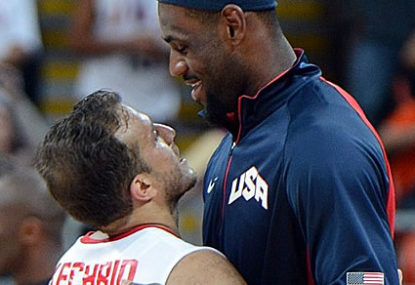In the 90s, the NBA was known as a big man’s league. With giant superstars like Shaquille O’Neal, Hakeem Olajuwon, and Patrick Ewing roaming the paint, the prevailing thought was that you needed a dominant centre on your roster to compete with the league’s elite teams.
Either that, or you needed Michael Jeffrey Jordan.
Not only was there a number of great players at the ‘C’ position, but the second and third tier of centres in that era were also very good players.
Rik Smits, Brad Daugherty, Dikembe Mutombo, Vlade Divac, Arvydas Sabonis, etc were no slouches.
In fact, if any of those players were playing today, they would probably be ranked in the top two or three centres in the game, rather than being placed much further down the pecking order like they found themselves in the 90s.
Such a sentiment highlights a not-so-subtle shift in the NBA in recent times. Though there remain a number of very good low post players in the league, the position with the most superstar depth at present is actually point guard.
While in the 90s many believed that you simply couldn’t do without an elite centre, that narrative has now changed to having a high caliber point guard on your roster.
Which suggests that the NBA is now a small man’s game.
Actually, that line – and the heading – is a little misleading.
It’s not that the NBA has suddenly shifted to being a league for midgets, but rather that there is a feeling that you need a playmaker to be truly successful in the modern NBA.
In essence, the belief is that you need a point guard if you want to win, because it seems like every NBA team has a good-to-great one calling the shots at present.
At the elite level, there is Chris Paul, Tony Parker, Russell Westbrook, Steph Curry, Derrick Rose, Kyrie Irving, Deron Williams and Rajon Rondo.
On the second tier, there’s John Wall, Mike Conley, Damian Lillard, Ty Lawson, Jrue Holiday, Eric Bledisloe and Ricky Rubio.
Behind those players, there is a solid cast including Jeff Teague, Jose Calderon, Andre Miller, Kemba Walker, Jarrett Jack, Brandon Jennings, Jeremy Lin, Raymond Felton, Steve Blake and Jameer Nelson.
You also have this season’s rookies with amazing potential, Michael Carter-Williams and Victor Oladipo.
That’s 27 quality point guards, and I haven’t even considered primary ball-handlers like LeBron James, Andre Iguodala and James Harden, who aren’t listed at ‘PG’, but very much play that role for their teams.
Another player absent from the list is two-time league MVP Steve Nash.
Considering how quickly he has succumbed to Father Time, there’s a good reason he has his own paragraph: he still deserves a mention, but he’s no longer anywhere near elite, and there have even been whispers he may retire at any moment due to his injuries.
With so many quality floor generals, NBA General Managers now treat the ‘1′ position the same way they did the centre spot in the 90s.
In other words, their thought process is “I gotta get me a point guard!”
The NBA has always been a copycat league. As soon as a team has some success with something slightly different, everyone jumps on the bandwagon.
Such trends have included: getting a centre, needing three All-Stars, going small, going big, pressing, Twin Towers, building around one high volume scorer, tanking, going ten deep, implementing run and gun offenses, stretch 4s, building through the draft, hiring a college coach, playing zone, corner threes, recruiting international players, rough and physical defence and the list goes on.
And so we come to point guards, somewhat the 2013 phenomenon.
Though the desire to have an elite level point guard is born out of the depth at the position at the moment, it’s always made sense to have a good NBA quarterback.
Good point guards handle the ball, display leadership ability, control the flow of the game, get all their teammates involved, play the role of ‘coach on the floor’, initiate the offense, break down the D if the offense falls apart, get easy buckets, push the fast break, and generally run the team.
Without all those qualities, most teams today – and throughout history – would struggle to win basketball games.
Though many will disagree, I personally think the point guard is the most important position in basketball.
Of course, I would say that as an ex-point guard myself.
Yet regardless of your own opinions on which position in basketball is the most vital, one cannot deny that it is currently the era of the great point guard in the NBA, and it’s making for some highly enjoyable play.





























































































